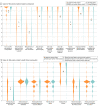Health Professional vs Layperson Values and Preferences on Scarce Resource Allocation
- PMID: 38470416
- PMCID: PMC10933708
- DOI: 10.1001/jamanetworkopen.2024.1958
Health Professional vs Layperson Values and Preferences on Scarce Resource Allocation
Abstract
Importance: COVID-19 prompted rapid development of scarce resource allocation (SRA) policies to be implemented if demand eclipsed health systems' ability to provide critical care. While SRA policies follow general ethical frameworks, understanding priorities of those affected by policies and/or tasked with implementing them is critical.
Objective: To evaluate whether community members and health care profesionals (HCP) agree with SRA protocols at the University of California (UC).
Design, setting, and participants: This survey study used social media and community-partnered engagement to recruit participants to a web-based survey open to all participants aged older than 18 years who wished to enroll. This study was fielded between May and September 2020 and queried participants' values and preferences on draft SRA policy tenets. Participants were also encouraged to forward the survey to their networks for snowball sampling. Data were analyzed from July 2020 to January 2024.
Main outcomes and measures: Survey items assessed values and preferences, graded on Likert scales. Agreement was tabulated as difference in Likert points between expressed opinion and policy tenets. Descriptive statistics were tested for significance by HCP status. Free text responses were analyzed using applied rapid qualitative analysis.
Results: A total of 1545 participants aged older than 18 years (mean [SD] age 49 [16] years; 1149 female participants [74%], 478 health care practitioners [30%]) provided data on SRA values and preferences. Agreement with UC SRA policy as drafted was moderately high among respondents, ranging from 67% to 83% across domains. Higher agreement with the interim policy was observed for laypersons across all domains except health-related factors. HCPs agreed more strongly on average that resources should not be allocated to those less likely to survive (HCP mean, 3.70; 95% CI, 3.16-3.59; vs layperson mean, 3.38; 95% CI, 3.17-3.59; P = .002), and were more in favor of reallocating life support from patients less likely to those more likely to survive (HCP mean, 6.41; 95% CI, 6.15-6.67; vs layperson mean, 5.40; 95% CI, 5.23-5.58; P < .001). Transparency and trust building themes were common in free text responses and highly rated on scaled items.
Conclusions and relevance: This survey of SRA policy values found moderate agreement with fundamental principles of such policies. Engagement with communities affected by SRA policy should continue in iterative refinement in preparation for future crises.
Conflict of interest statement
Figures



Similar articles
-
Promotion of Knowledge and Trust Surrounding Scarce Resource Allocation Policies: A Randomized Clinical Trial.JAMA Health Forum. 2024 Oct 4;5(10):e243509. doi: 10.1001/jamahealthforum.2024.3509. JAMA Health Forum. 2024. PMID: 39422889 Free PMC article. Clinical Trial.
-
Treating patients across European Union borders: An international survey in light of the coronavirus disease-19 pandemic.Eur J Anaesthesiol. 2021 Apr 1;38(4):344-347. doi: 10.1097/EJA.0000000000001423. Eur J Anaesthesiol. 2021. PMID: 33350712 Free PMC article.
-
Rapid deployment of a community engagement study and educational trial via social media: implementation of the UC-COVID study.Trials. 2021 Aug 2;22(1):513. doi: 10.1186/s13063-021-05467-3. Trials. 2021. PMID: 34340693 Free PMC article.
-
Evaluation of patient reporting of adverse drug reactions to the UK 'Yellow Card Scheme': literature review, descriptive and qualitative analyses, and questionnaire surveys.Health Technol Assess. 2011 May;15(20):1-234, iii-iv. doi: 10.3310/hta15200. Health Technol Assess. 2011. PMID: 21545758 Review.
-
Impact of summer programmes on the outcomes of disadvantaged or 'at risk' young people: A systematic review.Campbell Syst Rev. 2024 Jun 13;20(2):e1406. doi: 10.1002/cl2.1406. eCollection 2024 Jun. Campbell Syst Rev. 2024. PMID: 38873396 Free PMC article. Review.
Cited by
-
Promotion of Knowledge and Trust Surrounding Scarce Resource Allocation Policies: A Randomized Clinical Trial.JAMA Health Forum. 2024 Oct 4;5(10):e243509. doi: 10.1001/jamahealthforum.2024.3509. JAMA Health Forum. 2024. PMID: 39422889 Free PMC article. Clinical Trial.
-
An evidence map of clinical practice guideline recommendations and quality of non-pharmaceutical interventions for post-stroke emotional disorders.Front Neurol. 2025 Jun 9;16:1580799. doi: 10.3389/fneur.2025.1580799. eCollection 2025. Front Neurol. 2025. PMID: 40552046 Free PMC article. Review.
-
Bolstering agreement with scarce resource allocation policy using education: a post hoc analysis of a randomized controlled trial.BMC Health Serv Res. 2025 Apr 14;25(1):540. doi: 10.1186/s12913-025-12712-x. BMC Health Serv Res. 2025. PMID: 40229711 Free PMC article. Clinical Trial.
References
Publication types
MeSH terms
Grants and funding
LinkOut - more resources
Full Text Sources
Medical
Miscellaneous

